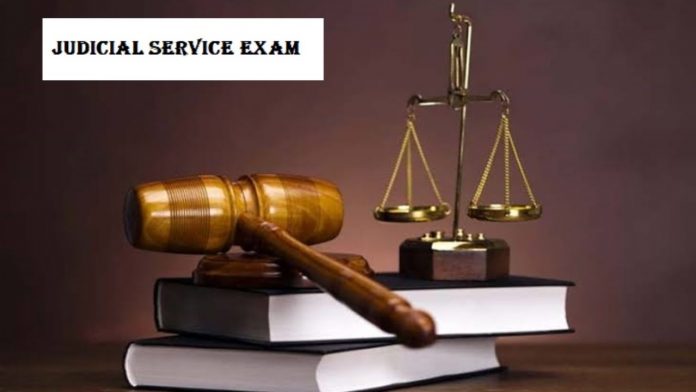This article is written by Team LawSikho.
Table of Contents
Bihar State Judiciary 2020-21
Law Graduates who wish to become members of subordinate judiciary should write the entry-level exam which is the Judiciary exam or the PCS (J)-Provincial Civil Service-Judicial Examination.
This exam is uniformly divided into 3 stages of Preliminary, Mains and Interview, across all States in India.
The State government under the supervision of respective High Courts appoints members of the subordinate judiciary.
Selection process is further dependent on yearly vacancies/number of seats.
Judicial services offer several attractive features which include handsome perks and privileges including among others- rent-free accommodation, fuel allowances, subsidized electricity and water supplies, telephone allowances, and bursaries for children’s education.
ELIGIBILITY
- The candidate must have completed the age of 22 years (minimum); but he/she must not have completed 35 years of age (maximum) as on the specific cut off date mentioned in the official advertisement for the year.
- Refer to the official advertisement for various relaxations allowed for various categories of applicants, such as SC / ST / Ex-Servicemen etc.
- Candidates must have completed a Bachelor Degree of Law from a recognized University – approved by the BCI.
SYLLABUS
Phase I Prelims:
The Bihar Judicial Service Preliminary exam has two papers :
- Paper 1 – multiple choice questions from General Studies / General Knowledge for 100 marks.
- Paper 2- multiple choice questions from Law topics for 150 marks.
Paper 1
- General Knowledge including current affairs **
- Current events of national and international importance
- History of India and Indian National Movement
- Indian and World Geography
- Indian Polity and Economy
- The questions will be of the level which the candidates should be able to answer without special study.
- Elementary General Science
- A paper of questions to test such matters of everyday observation and experience in their scientific aspects as may be expected of an educated person, who has not made a special study of any scientific subject.
Paper 2
- Law of Evidence & Procedure
- Indian Evidence Act (1 of 1872)
- Civil Procedure Code (5 of 1908)
- Arbitration and Conciliation Act 1996
- Code of Criminal Procedure, 1973 (2 of 1974)
- Provincial Small Cause Courts Act, 1887
- Constitutional and Administrative Law of India
- Constitution of India – Article 1 to 395 and Schedules
- Administrative Law of India :
- Delegated Legislation
- Control of Delegated Legislation – Judicial & Legislative
- Fair Hearing; Rules of Natural Justice; Rules Against Bias; Audi Alteram Partem
- Tribunals and Quasi-Judicial Authorities; Judicial Control over them
- Regulatory- Authorities
- Judicial Review of Administrative Action
- Writ Jurisdiction and Statutory Judicial Remedies, Scope, Extent & Distinction
- Public Interest Litigation
- Tortious Liability of State and Compensation
- Promissory Estoppel, Legitimate Expectation & Doctrine of Proportionality
- Government Contracts
- Ombudsman
- Hindu Law & Muhammadan Law
- Hindu Law including Schools, Marriage, Adoption, Impartible Estate, Endowment
- Muhammadan Law including Marriage Law, Adoption, Wills, Legitimacy, Acknowledgement, Guardianship
- Law of Transfer of Property, Principles of Equity, Law of Trusts and Specific Relief Act
- Law of Contracts & Torts
- Commercial Law
- The main principles of law relating to
- Sale of Goods,
- Negotiable Instruments,
- Company Law
- Partnership.
- The main principles of law relating to
** The General knowledge paper will include both static and current GK related questions. Static GK refers to information that will not change. Dynamic or current GK refers to facts that will change and get updated over time.
Phase II Mains Exam:
There are five compulsory papers, of which Hindi & English are of qualifying nature.
- General Knowledge / General Studies including Current Affairs – 150 marks
- Current events of national and international importance
- History of India and Indian National Movement
- Indian and World Geography
- Indian Polity and Economy
- The questions will be of the level which the candidates should be able to answer without special study.
- Elementary General Science – 100 marks
- A paper of questions to test such matters of everyday observation and experience in their scientific aspects as may be expected of an educated person, who has not made a special study of any scientific subject.
- General Hindi – 100 marks
- General English – 100 marks
- Spotting Errors in sentences and phrases
- Antonyms and Synonyms
- Fill in the blanks with missing words
- Usage of prepositions, idioms and phrases
- Word analogies
- Test of spellings
- Rearranging sentences
- Questions to test comprehension – with a passage to be read and questions based on the same.
- Questions will be set to test the understanding of and the power to write English. A passage or passages will usually be set for summary or precis.
- Questions will include letter writing on a given subject.
- Law of Evidence and Procedure – 150 marks
- Indian Evidence Act (1 of 1872)
- Civil Procedure Code (5 of 1908)
- Arbitration and Conciliation Act 1996
- Code of Criminal Procedure, 1973 (2 of 1974)
- Provincial Small Cause Courts Act, 1887
There will be a choice of five optional papers, from which, candidates have to select three :
- Optional Constitutional Law of India and England – 150 marks
- Hindu law and Mohammedan law – 150 marks
- Hindu Law including Schools, Marriage, Adoption, Impartible Estate, Endowment
- Muhammadan Law including Marriage Law, Adoption, Wills, Legitimacy, Acknowledgement, Guardianship
- Transfer of Property Act, Principles of Equity, Law of Trusts and Specific Relief Act – 150 marks
- Law of Contract and Torts – 150 marks
- Commercial Law – 150 marks
- The main principles of law relating to:
- Sale of Goods,
- Negotiable Instruments,
- Company Law
- Partnership.
- The main principles of law relating to:
Phase III
Viva Voce or Interview
Candidates who qualify the Prelims and Mains Exam will be called for a personal interview round. The final interview will carry 100 marks in the merit list.
If you are interested in creating a foolproof strategy for your judiciary preparation, sign up for a judiciary preparation workshop that we are conducting on 14th December for more insights.
For more insights and updates about the judiciary exam, join our Whatsapp group here.
SOURCE
http://patnahighcourt.gov.in/ , http://bpsc.bih.nic.in/
LawSikho has created a telegram group for exchanging legal knowledge, referrals and various opportunities. You can click on this link and join:
 Serato DJ Crack 2025Serato DJ PRO Crack
Serato DJ Crack 2025Serato DJ PRO Crack











 Allow notifications
Allow notifications


